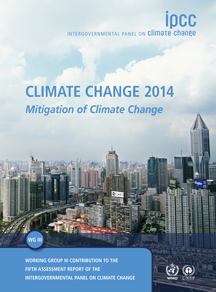UN: Earth warming undeniable, pollution its chief cause

The report also points once again to pollution as the main culprit. ““Warming of the climate system is unequivocal, and since the 1950s, many of the observed changes are unprecedented over decades to millennia,” the IPCC report stated.
The report said this is evidenced by the diminishing amounts of snow and ice, the rise in sea level and the increased concentrations of greenhouse gases in the atmosphere.
While the report is global, Cebu which is in the middle of the Philippine archipelago stands to bear the brunt of climate change impacts. The latest IPCC report draws anew a direct correlation between a warming planet and extreme weather events.
“Changes in many extreme weather and climate events have been observed since about 1950…It is likely that the frequency of heat waves increased in large parts of Europe, Asia and Australia. There are likelymore land regions where the number of heavy precipitation events has increased than where it has decreased,” the report said.
Among the definitive findings of the report that may directly impact on the country are the mean average temperature increase and sea level rise. According to the report, in the period 2003 to 2012, average temperature rise was 0.78 Celsius (0.72 to 0.85).
“The globally averaged combined land and ocean surface temperature data as calculated by a linear trend show a warming of 0.85 [0.65 to 1.06] C over the period 1880 to 2012,” the IPCC report said.
In affirming the human-caused or anthropogenic cause of climate change, the IPCC said that “The atmospheric concentrations of carbon dioxide, methane, and nitrous oxide have increased to levels unprecedented in at least the last 800,000 years.”
“Carbon dioxide concentrations have increased by 40% since pre-industrial times, primarily from fossil fuel emissions and secondarily from net land use change emissions. The ocean absorbed 30 percent of the emitted anthropogenic carbon dioxide, causing ocean acidification,” the UN-IPCC report said.
In reaction to this recent scientific findings on climate change, environmental groups in the country called on the Aquino administration to address the problems at home.
Cebuano climate campaign Aaron Pedrosa said the latest IPCC report is instructive.
“The Philippine government must stop its addiction to coal and radically shift to renewable energy.There is no place for coal in a changing climate,” said Pedrosa of Sanlakas, head of the energy working group of PMCJ.
“Instead of investing in climate resiliency efforts for its communities, the bid for more coal plants will heighten and increase the impacts and vulnerabilities experienced on the ground. The recent onslaught of typhoon Haiyan should prod the government to lead in the global call to abandon dirty energy sources.” Pedrosa said.
The Philippine Movement for Climate Justice said the disclosure that “current levels of mitigation action put us on track for up to 5°C of warming by 2100, which means it would be 5 times more of what we are experiencing now in terms of climate change impacts.”
“The report is clear we need to set a global limit, or emissions budget, on climate pollution in order to keep warming below 1.5°C to avoid the worst impacts of climate change,” Gerry Arances, national coordinator of PMCJ said.
A 2012 study by the WWF and the Bank of the Philippine Islands Foundation entitled “Business Risk Assessment and the Management of Climate Change Impacts” done in eight cities, including Cebu City, across the country, find Metro Cebu exposed to all six “climate scenario.”
These include 1) El Niño; 2) Sea surface temperature rise between 1 to 4 degrees Celsius; 3) Ocean acidification; 4) Sea level rise from four to six meters; 5) tropical cyclones becoming more intense; and 6) Increased precipitation resulting in above normal rainfall which could trigger floods and landslides.
The Intergovernmental Panel on Climate Change is a scientific intergovernmental body under the auspices of the United Nations.
Disclaimer: The comments uploaded on this site do not necessarily represent or reflect the views of management and owner of Cebudailynews. We reserve the right to exclude comments that we deem to be inconsistent with our editorial standards.
